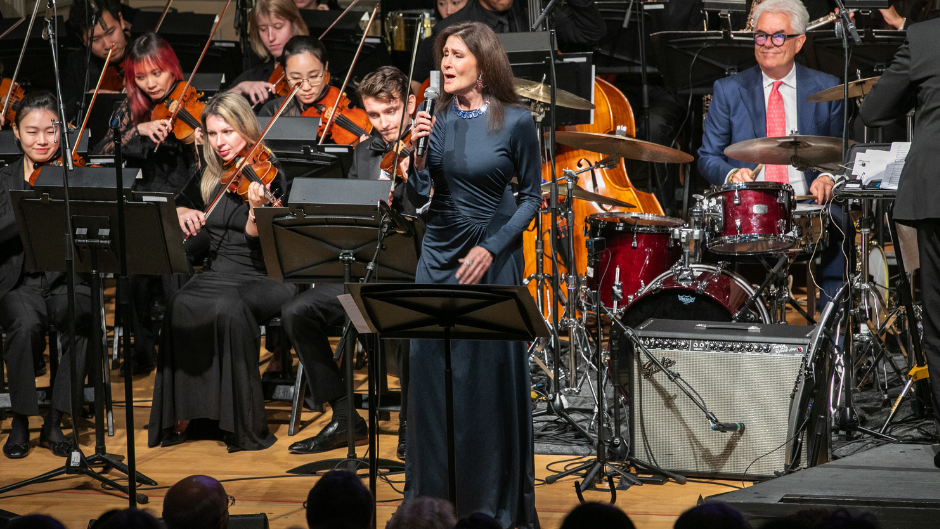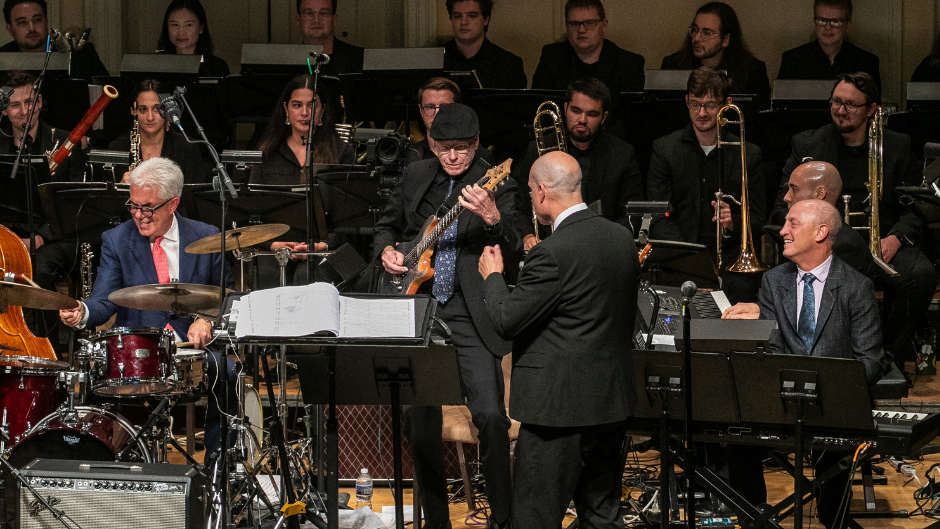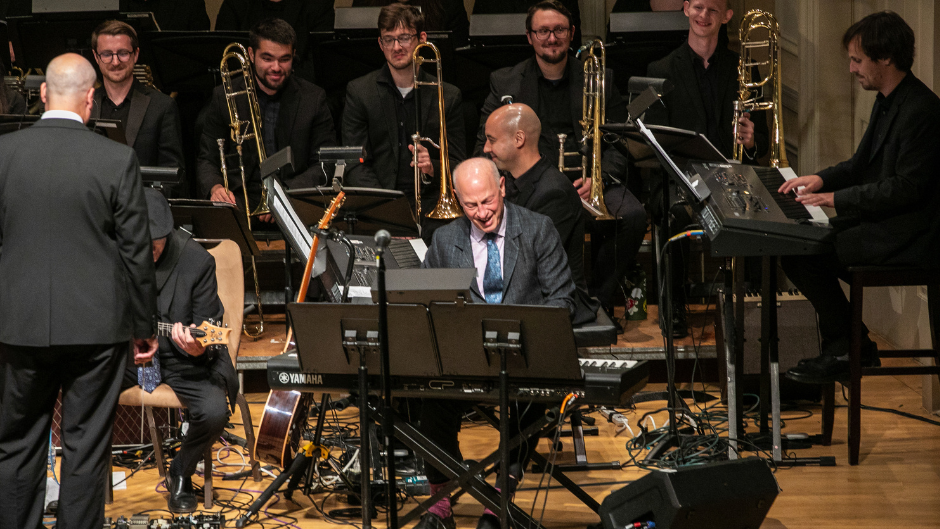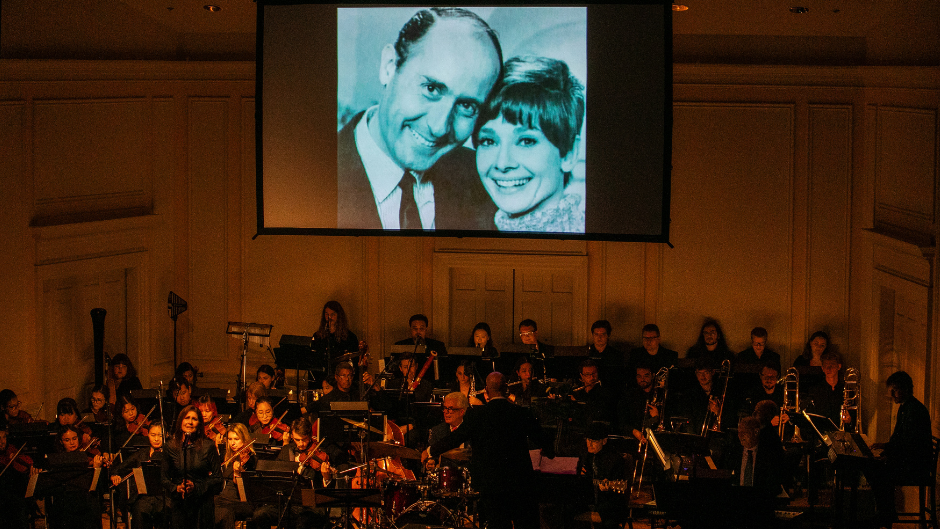The Frost School of Music’s Henry Mancini Institute Orchestra has performed in multiple major concerts across the country this year, playing a significant role celebrating the centennial of Henry Mancini, the composer whose film and television scores are an indelible part of American culture.
But none of these events has captured the power of that effort like the Henry Mancini at 100 concert the HMI Orchestra played at the Library of Congress in Washington, DC last month. The September 28 show was the finale of a month-long festival celebrating Mancini’s legacy in the vast repository of the nation’s history and culture. It is home to the complete Henry Mancini archive, with enough material to span a football field's length.
“This was not the largest,” said Frost School Dean Shelton G. Berg. “But of all the celebrations, this was the most meaningful.”
“It was daunting but inspiring,” said HMI Fellow and violinist Justin Kinchen. “You’re in the midst of living history. We are the Mancini Institute Orchestra playing from his collection, which is around us.”

The concert took place in the historic Coolidge Auditorium, an intimate space with superb acoustics, which combined with powerhouse guests and a rapturous, sold-out audience to create an extraordinary atmosphere.
“When we finished, we all agreed it was the best of the Mancini 100 concerts,” said Monica Mancini, the composer’s daughter and singer, who leads the effort, on and offstage, to keep her father’s legacy alive. “The intimacy and the quality of the music and musicians all came together in such a beautiful way. It was exhilarating.”
The Mancini archives make up one of the Library’s largest and most treasured collections, said Anne McLean, senior producer for concerts and special projects and leader of the Library’s programming team. “Henry Mancini is an iconic figure in American music,” McLean said. “He was an incredibly inventive, innovative, sophisticated composer whose film scores are indelible in everyone’s memories.”
The Library hosted a month-long Mancini festival of film screenings of classics like “Days of Wine and Roses” and “Charade,” talks, and exhibits. The HMI Orchestra was crucial to the finale. “We wanted to work with people who are aware of his legacy and versed in his scores,” said McLean, who praised the HMI Fellows’ talent and skill. “Even though the membership changes, the management of the Orchestra has inculcated these values of musicianship, passion, drive and commitment.”

The Frost School group's whirlwind trip lasted from Friday to Sunday morning. A generous gift from Al and Jane Nahmad helped underwrite the students' experience. Many toured the Library’s collection of rare instruments (including James Madison’s crystal flute, played by Lizzo) or other sites in the capitol—the first time many of HMI’s international fellows had visited there.
However, the most potent part of the trip was the sense of intimacy with Mancini’s history and music. The halls leading to the theater were lined with glass cases filled with Mancini’s awards and handwritten scores. Berg was thrilled to see the composer’s first penciled drafts, like the piano part for the famous Pink Panther theme “coming from his hand when it first jumped out of his brain.”
Only 39 musicians, just over half the HMI Orchestra, could fit on the Coolidge’s small stage. They were crammed shoulder to shoulder, and the tight quarters created an extraordinary musical unity. “We were so close to each other we were playing inside each other’s sound,” said Kinchen. “It sounded so good it almost makes you rethink how to set up an orchestra,” said Berg. “The cohesion of the sound was amazing.”

They were bolstered by stellar guest artists: violinist Charlie Bisharat, bassist Reggie Hamilton, guitarist Dean Parks, and saxophonist Tom Scott. Berg played keyboard because there was no room for a piano onstage, and Monica Mancini’s husband Gregg Field, a multi-award winning musician and producer, played drums. HMI resident conductor Scott Flavin led the ensemble.
Monica Mancini was both vocalist and hostess, narrating the concert with warm anecdotes about her father, his music, and the films and shows he scored, sometimes accompanied by film clips. The love theme for “Two for the Road,” Monica Mancini said, “not only became his personal favorite composition, it also became my parents’ song.” One of the most emotional moments came when she read a letter that Audrey Hepburn wrote to Mancini about his score for “Breakfast at Tiffany’s,” which included “Moon River,” his most iconic and beloved song.
“A movie without music is a little bit like an airplane without fuel,” Hepburn wrote. “Your music has lifted us all and sent us soaring. Everything we cannot say with words or show with action you have expressed for us.”

The audience adored it. “It was a super enthusiastic audience,” said McLean. “We had tons of compliments after the show.”
Like Hepburn’s letter, their response is a testament to the potency of Mancini’s music and the art form that the Frost School students are learning so well.
“When the audience is keyed into what you’re doing and responding so enthusiastically, and you can feel that, you get to understand the power of what you do,” Berg said. “It’s really important for musicians to get to know that.”

